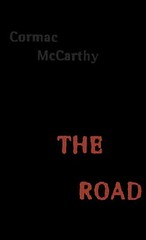
The Road (2006) by Cormac McCarthy
Hardcover, Knopf, 256 pp.
I received this book on specific instructions this Christmas after its heavy exposure in the press this year and of course reading the review in Buzby's 50 books (even though he called it 'superficial'). I'd never considered Cormac McCarthy as an author that I'd be interested in reading. He's well-regarded and has been recommended by friends, but I think the taint of some of his books being westerns guided me. Regardless, my excitement that a book of genre fiction, and in particular, post apocalyptic fiction getting so much attention was high.
I have to admit it was a great novel, although not without some flaws. McCarthy is really an amazing writer. The writing is sparse. Yet the detail of the scenes he draws are powerful. Consider the following:
"Something woke him. He turned on his side and lay listening. He raised his head slowly, the pistol in his hand. He looked down at the boy and when he looked back toward the road the first of them were already coming into view. God, he whispered. He reached and shook the boy, keeping his eyes on the road. They came shuffling through the ash casting their hooded heads from side to side. Some of them wearing canister masks. One in a biohazard suit. Stained and filthy. Slouching along with clubs in their hands, lengths of pipe. Coughing."
The amazing thing is that the story really has very little arc. It begins well into a nuclear winter with a father and son (probably about 10 yo) traveling south to try and find somewhere warm to live. Day after day they trudge forward eternally on a quest for food and trying to avoid the other scavengers left alive. He sketches a world so venal that every encounter with another human could be their final one.
The Road falls firmly within the American style of postapocalyptic fiction in that it is predominantly survivalist. The impetus is that the protagonist carries with them the positive ethics/morals from before the apocalypse. In the novel, the father makes choices that he describes to his son as those that separate them from the 'bad' guys. However, increasingly these choices become less and less ethical as their situation deteriorates. The love and desire to protect his son is so powerful as to render any judgment of what is 'right' irrelevant. And this love of a father for his son is really only the social element in the book.
Whereas the tradition of British postapocalyptic fiction used the disaster to examine questions of social structure or class or what have you, this novel forgoes that completely. The world is so utterly destroyed that living until the next day is all that matters.
I really enjoyed this novel. It is by no means perfect and is so bleak as to be almost too depressing. The resourcefulness and real survival skills of the father were refreshing to see in this sort of fiction.

2 comments:
"The resourcefulness and real survival skills of the father were refreshing to see in this sort of fiction" This is what makes me turn the corner and want to read this book. McCarthy is good at making skilled characters with real skills. It sounds bleak. Cool. Also, I just saw that No Country for Old Men is in filming and its the Coen brothers in charge. Potential.
Dude--Didn't you find the repetition of waking up, eating something and going out into the world to look for food and avoiding death too repetitive? The book is well written but I think that it could have used even more detail and much better character building.
Post a Comment